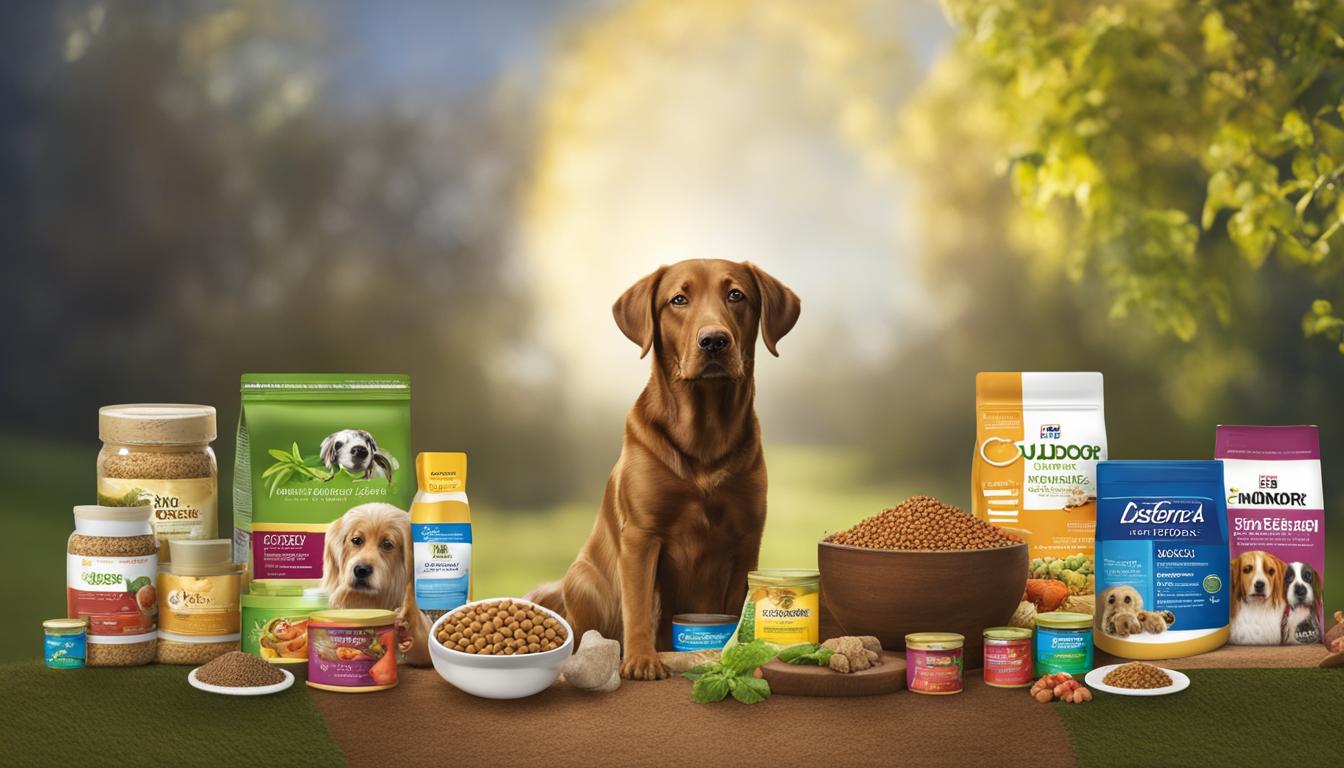Welcome to our guide on providing proper nutrition for your pregnant and lactating dogs. Taking care of their nutritional needs during this crucial time is essential for their overall health and the successful reproduction of healthy puppies. By following these guidelines, you can ensure that your furry friend receives the best possible care.
Key Takeaways:
- Optimal nutrition is crucial for successful reproduction in dogs.
- Obesity can lead to complications during pregnancy and lactation.
- Pregnant dogs require a highly digestible, high-quality puppy food.
- Lactating dogs have increased energy requirements and need a nutrient-rich puppy diet.
- Monitoring weight, body condition, and food consumption is important for both pregnant and lactating dogs.
Importance of Nutrition for Reproduction in Dogs
The connection between nutrition and reproduction in dogs is undeniable. The role of optimal nutrition extends beyond just providing sustenance; it directly impacts hormonal regulation, fertility, pregnancy outcomes, lactation, and neonatal development. While the literature on the influence of nutrition in dog reproduction is still limited compared to farm animals and humans, increasing attention is being given to the importance of nutrition in reproductive function in companion animals like dogs.
Several essential nutrients play a crucial role in the reproductive health of dogs. Glucose deprivation and the secretion of hormones like leptin, kisspeptin, thyroid hormones, and insulin growth factor 1 (IGF-1) are influenced by nutrition and significantly impact reproductive function. However, it is important to note that the nutritional requirements for reproduction in dogs differ from those for adult maintenance. Awareness of the key aspects of feeding during critical periods like pregnancy, lactation, and weaning is essential to optimize reproductive performance in dogs.
While scientific research continues to shed light on the intricate relationship between nutrition and reproduction in dogs, it is vital for dog owners and breeders to understand the significance of providing a healthy diet for their pregnant canines. By ensuring proper nutrition, dog owners can help support successful pregnancies, healthy puppies, and the overall well-being of the mother dog.
Table: Key Nutrients for Reproduction in Dogs
| Nutrient | Function | Sources |
|---|---|---|
| Protein | Supports tissue growth and repair | Meat, fish, eggs |
| Fat | Provides energy and aids in hormone production | Oils, fatty meats |
| Calcium | Supports bone growth and milk production | Dairy products, leafy greens |
| Iron | Essential for oxygen transport and energy metabolism | Red meat, liver, beans |
| Vitamin A | Important for fetal growth and vision development | Carrots, sweet potatoes, liver |
| Vitamin E | Protects cells from oxidative damage | Nuts, seeds, vegetable oils |
This table highlights some of the key nutrients that contribute to the reproductive health of dogs. Incorporating these nutrients into a well-balanced diet can help support optimal reproductive function and contribute to the overall well-being of both the mother dog and her puppies.

“The link between nutrition and reproduction in dogs is irrefutable. Providing an optimal diet for pregnant canines not only supports successful pregnancies but also ensures the health and vitality of the puppies.”
Nutritional Management During Pregnancy in Dogs
Pregnancy is a critical time for dogs, and proper nutrition plays a crucial role in ensuring the health and well-being of both the mother and her puppies. Feeding a balanced diet throughout pregnancy is essential to meet the increased energy and nutrient requirements.
When it comes to feeding pregnant dogs, it is important to start with an ideal body condition before breeding. Ensuring that the dog is in good shape optimizes fertility and ensures appropriate birth weight for the puppies, reducing the risk of pup mortality. During the first six weeks of pregnancy, it is advisable to switch to a food designed for growth and reproduction, such as a puppy formula, to prepare the dog for the energy- and nutrient-dense diet required in later stages of gestation and lactation.
As the pregnancy progresses, the energy needs of the dog increase. From the sixth week of gestation, it is recommended to offer several meals daily or provide free-choice feeding to ensure sufficient nutrition despite the limited space in the abdomen. Monitoring the dog’s weight and body condition is important to avoid excessive calorie intake. The diet should meet the minimal recommendations for proteins, fat, calcium, and phosphorus set by the Association of American Feed Control Officials (AAFCO).
| Key Nutrient | Recommended Intake |
|---|---|
| Protein | 22-32% |
| Fat | 10-20% |
| Calcium | 0.8-1.6% |
| Phosphorus | 0.5-1.0% |
Proper nutritional management during pregnancy helps ensure a healthy and successful reproduction journey for both the mother and the puppies. By providing the right balance of nutrients and closely monitoring the dog’s weight and body condition, you can help ensure optimal health and well-being for your furry friend and her future offspring.

Nutritional Management During Lactation in Dogs
Proper nutrition is crucial for postpartum dogs to ensure they have the energy and nutrients needed to support their lactation and provide for their puppies’ growth. Lactation is a demanding phase for dogs, as their energy requirements increase significantly during this time. Feeding a balanced diet that meets these increased needs is essential for the health of both the mother and her puppies.
During the first three to four weeks of lactation, milk production reaches its peak, and the dam’s energy requirements are at their highest. To meet these increased energy demands, it is recommended to feed the lactating dog several times a day or provide free choice feeding. This ensures she has constant access to food and can replenish the energy she expends in producing milk.
Vitamins for Pregnant Dog Health: In addition to providing adequate energy, vitamins play a crucial role in supporting the overall health of pregnant dogs. Certain vitamins, such as vitamin E and vitamin B complex, are particularly important during lactation. These vitamins are involved in various metabolic processes and can help support the dog’s immune system and overall well-being. Ensuring that the lactating dog’s diet contains appropriate levels of these essential vitamins is important for her health and the health of her puppies.
Table:
| Nutrient | Recommended Intake |
|---|---|
| Protein | 25-30% |
| Fat | 15-20% |
| Calcium | 1.2-2% |
| Phosphorus | 1-1.6% |
| Vitamins | Refer to AAFCO guidelines |
It is important to note that water intake also increases during lactation, so providing the lactating dog with easy access to fresh water is essential. Dehydration can negatively affect milk production and the overall health of the mother.
As the puppies begin to transition to solid food, the mother’s milk production naturally declines. On the day of weaning, the puppies should be separated from the dam, and her food intake should be gradually increased over the next three days to return to her pre-breeding maintenance level. This gradual adjustment helps prevent sudden changes in food intake and supports the mother’s transition back to a non-lactating state.
By providing proper nutrition and monitoring the lactating dog’s weight, body condition, and food consumption, dog owners can help ensure a healthy and successful lactation period for both the mother and her puppies.
Nutritional Requirements for Neonates and Weaning
Proper nutrition is crucial for the healthy growth and development of neonatal puppies. While bitch’s milk alone can sustain them for the first three to four weeks, introducing semi-solid food at around three weeks helps alleviate the nutritional burden on the mother and prepares the puppies for weaning. A gruel made of dry food and warm water can be offered initially, gradually reducing the food-to-water ratio as the puppies grow. By the age of six to eight weeks, they should be fully transitioned to solid food.
To ensure optimal growth, it’s important to keep the puppies on the same diet throughout weaning. This avoids digestive upset and ensures they receive the appropriate level of energy and nutrients for their rapid growth. Additionally, a consistent diet helps maintain stability in their intestinal flora. After weaning is complete, puppies can be switched to a breed size-appropriate diet to support their ongoing development.
Benefits of Early Introduction to Semi-Solid Food:
- Reduces nutritional burden on the mother
- Prepares the puppies for weaning
- Helps stabilize the puppies’ intestinal flora
“Introducing semi-solid food to puppies at around three weeks of age not only supports their nutritional needs but also provides them with the necessary exposure to different textures and flavors, helping them develop healthy eating habits.”
Table: Nutritional Requirements for Neonates
| Nutrient | Requirement |
|---|---|
| Protein | 25-30% of daily caloric intake |
| Fat | 8-10% of daily caloric intake |
| Calcium | 1.2-1.8% of total diet |
| Phosphorus | 0.8-1.5% of total diet |
| Vitamin D | 300-500 IU per kilogram of body weight |
| Vitamin E | 15-20 IU per kilogram of body weight |
Meeting these nutritional requirements is essential for the proper growth and development of neonatal puppies. It’s important to consult with a veterinarian to ensure the diet provided meets these needs and supports the puppies’ overall health during this critical stage of their lives.

The Nutritional Differences
To better understand the specific nutritional needs of pregnant and lactating dogs and cats, let’s compare them side by side:
| Nutrient | Dogs | Cats |
|---|---|---|
| Protein | Dogs require higher protein levels to support fetal growth and milk production. | Cats also need a high protein diet, but the requirements are not as elevated as in dogs. |
| Fat | Adequate fat intake is crucial for energy and nutrient absorption in both dogs and cats. | Similar to dogs, cats require sufficient fat for energy and nutrient absorption during pregnancy and lactation. |
| Calcium and Phosphorus | Dogs need higher levels of calcium and phosphorus to support fetal skeletal development and milk production. | Cats also require increased calcium and phosphorus for fetal skeletal development and milk production. |
| Taurine | Dogs do not have specific taurine requirements during pregnancy or lactation. | Taurine is an essential nutrient for cats, and it becomes even more important during pregnancy and lactation. |
These nutritional differences emphasize the importance of providing species-specific diets for pregnant and lactating dogs and cats. By meeting their unique nutritional requirements, we can ensure the best possible outcomes for both the mother and her offspring.
Key Elements of Feeding Management for Pregnant and Lactating Dogs
Feeding management plays a crucial role in ensuring the health and nutrition of pregnant and lactating dogs. The nutritional needs of these dogs significantly increase during these periods, and it is essential to provide them with the right balance of energy and nutrients to support their reproductive journey. To effectively manage the feeding of pregnant and lactating dogs, here are some key elements to consider:
Pregnant Dogs:
- Transition to a more energy- and nutrient-dense diet during late gestation.
- Monitor the dog’s weight and body condition regularly to ensure optimal health.
- Follow the minimal recommendations for proteins, fat, calcium, and phosphorus set by AAFCO.
Lactating Dogs:
- Feed several times per day or provide free choice feeding to meet the higher energy demands.
- Ensure the dam has access to plenty of water to support milk production.
- Gradually decrease the dam’s food intake after weaning to return to her pre-breeding maintenance level.
Additionally, specific nutrients like folic acid and taurine have proven benefits for pregnant dogs. Supplementation with EPA and DHA can also benefit the development of puppies. It is crucial to monitor the dog’s weight, body condition, and food consumption throughout pregnancy and lactation to ensure optimal health for both the mother and the puppies.
| Nutritional Recommendation | Benefits |
|---|---|
| Folic Acid | Supports fetal development and helps prevent neural tube defects. |
| Taurine | Essential for normal cardiac function and eye health in both the mother and the puppies. |
| EPA and DHA | Aids in brain and eye development in puppies. |
By focusing on these key elements of feeding management, you can help ensure that your pregnant and lactating dogs receive the nutrition they need to thrive. Remember to consult with a veterinarian to develop a customized feeding plan based on your dog’s individual needs and health conditions. Taking proactive steps to provide optimal nutrition will contribute to the overall health and well-being of both the mother and her puppies.
Conclusion
Nutrition plays a crucial role in the overall health and well-being of pregnant and lactating dogs. By providing a healthy and balanced diet, you can optimize fertility, support successful pregnancies, and promote the well-being of both the mother and her puppies.
Throughout each stage of reproduction, it is essential to feed your dog the right balance of nutrients. Monitoring her weight, body condition, and food intake is key to ensuring optimal health. Gradually transitioning to a more energy- and nutrient-dense diet during late gestation can help meet the increased demands of pregnancy.
Remember, nutrition is not a one-size-fits-all approach. Each dog is unique, and their nutritional needs may vary. Following the recommended guidelines, such as those set by the Association of American Feed Control Officials (AAFCO), can help you provide the best care for your pregnant or lactating canine companion.
By prioritizing proper nutrition and following these guidelines, you can play an active role in supporting your dog’s reproductive journey. So, give your furry friend the nourishment she needs and ensure a healthy and successful pregnancy. Your pregnant or lactating dog will thank you for it!
FAQ
Why is optimal nutrition important for pregnant and lactating dogs?
Optimal nutrition is crucial for successful reproduction in dogs. It plays a role in conception, pregnancy, delivery of puppies, and the overall health of both the mother and the puppies.
What are the consequences of malnourished dogs during reproduction?
Malnourished dogs may suffer reproductive consequences, including smaller litter sizes and decreased milk production.
How should I monitor my dog’s weight and body condition during pregnancy?
It is important to monitor the dog’s weight and body condition during pregnancy, avoiding both overfeeding and underfeeding. Regular veterinarian check-ups can provide guidance on feeding and weight management.
What should I feed my pregnant dog during the third trimester?
During the third trimester of pregnancy, a highly digestible, high-quality puppy/growth/development formulation is recommended to meet the increased energy requirements.
How can I ensure my lactating dog receives enough nutrition?
Feeding a highly digestible, nutrient-rich puppy food is crucial to meet the demands of milk production and maintain the mother’s body condition. Feeding several times per day or free choice during the first three to four weeks of lactation helps meet the higher energy demands.
When should I start introducing solid food to puppies?
Puppies can be introduced to semi-solid food, such as a gruel made of dry food and warm water, at about three weeks of age. The food-to-water ratio should be gradually reduced as the puppies grow, eventually transitioning to solid food by six to eight weeks of age.
Do pregnant dogs and cats have different feeding requirements?
Yes, pregnancy lengths differ between dogs and cats, and their feeding requirements during pregnancy also differ. It’s important to consider these differences when determining the most appropriate feeding management for pregnant dogs and cats.
How can I ensure optimal health for both the mother and the puppies?
Monitoring the dog’s weight, body condition, and food consumption throughout pregnancy and lactation is important to ensure optimal health for both the mother and the puppies. Following recommended nutritional guidelines and transitioning to a more energy- and nutrient-dense diet as needed can help meet their increased energy and nutrient requirements.





